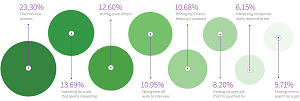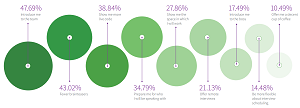News
Developers Reveal What It Takes To Hire Them
- By David Ramel
- March 21, 2016
Simple things like introducing job-seekers to the dev teams they might be working with and ditching the brain-teaser approach can help enterprises hire the best coding talent, according to a new hiring guide based on the voices of developers themselves.
To hire the best software developers, you first need to understand them, says Stack Overflow, the popular Q&A site for coders, which just published the guide providing career insights and hiring tips based on a massive new survey. It provides tips such as how to improve the interview process, which devs say is the most annoying aspect of the job search.
The company is branching out into the careers field, offering hiring services based on research that provides unique insights into the minds of the tens of millions of developers who visit its site monthly to get help with coding problems.
Those research insights have been distilled into the new Developer Hiring Landscape 2016 report, culling a more comprehensive global survey's results from more than 56,000 worldwide respondents down into a U.S.-focused report.
Though a developer skills shortage has resulted in a tight labor market where developers are in control, some 75 percent of them are still open to new opportunities, and Stack Overflow says its hiring guide helps employers "discover what it really takes to hire great developers in a competitive market."
 [Click on image for larger view.]
Most Annoying Aspects of the Job Search (source: Stack Overflow)
[Click on image for larger view.]
Most Annoying Aspects of the Job Search (source: Stack Overflow)
The report reveals that some 23 percent (figures are rounded off) of respondents find the interview process to be the most annoying aspect of a job search. "Developers who aren't being hounded by recruiters or getting jobs through their friends experience the pain of job searching," the report said. "Interviews, cover letters, and CVs all seemed to be pain points for job-seeking developers."
To alleviate that pain, Stack Overflow said companies can introduce applicants to the team (reported by 48 percent of respondents), use fewer brain-teasers (43 percent), show more live code (39 percent), prepare applicant for their interviewers (35 percent) and show them their prospective work spaces (28 percent).
 [Click on image for larger view.]
How Companies Can Improve the Interview Process (source: Stack Overflow)
[Click on image for larger view.]
How Companies Can Improve the Interview Process (source: Stack Overflow)
The report indicated the obvious -- salary is the No. 1 thing devs look for in a new job opportunity -- but also that work/life balance figures prominently, listed by more than half of respondents. "No surprise, salary is the one thing most developers care about when evaluating a new job opportunity," the report said. "But it isn't necessarily the thing they care about most. Indeed, 39 percent of U.S. developers didn't include salary on their list of priorities."
Being involved with new things is also of paramount importance to developers, as 66 percent said learning new technologies was important to them at work, closely followed by "building something new," reported by 59 percent.
On the other side of that coin, the main challenges at work include unspecific requirements (33 percent), unrealistic expectations (32 percent), poor documentation (32 percent), fragile code base (31 percent) and an inefficient development process (30 percent).
In a market where many devs can pick and choose their preferred positions, 25 percent of respondents said they weren't interested in new job opportunities. While only 14 percent said they were actively looking, some 60 percent said they would be open to new opportunities.
Other highlights listed in the report include:
- Developers under the age of 20 identified the most as a "Programmer." 30 percent of "Senior Developers" were in their 20s. Seniority is more about expertise within a topic and scope of responsibility, not just pure years of experience.
- What developers consider themselves is often different from their official job title. For the fourth year in a row, "Full Stack Web Developer" was the most common response.
- 81 percent of developers have at least two years of programming experience. Developers gain experience by building things, whether they're doing it unpaid, part-time, or on the job. 49 percent of surveyed developers have six or more years of programming experience.
- Developers are learning to code in a variety of different ways. 69 percent of U.S. developers said they are at least partly self-taught. (In fact, Stack Overflow thinks that number is probably closer to 100 percent).
- 23 percent of developers discovered their current job through a recruiter of some sort. Only 5 percent of developers found their current job through social media.
- A large part of a developer's job satisfaction relies on their day-to-day job duties. Some despise spending most of their day fixing bugs, while others crave the ability to constantly check in code. Overall, there is a strong correlation between job satisfaction and checking in code.
- Remote work is here to stay. 35 percent of U.S. developers work at least part-time remote. As more and more companies embrace the benefits of having remote employees, Stack Overflow predicts this number will increase.
- Some developers are so passionate about code that they spent their free time working on open source or side projects. 85 percent of developers spent at least one hour per week coding after (or before) their regular job.
- Only 23 percent of respondents agree completely with the statement: "I love my boss." The largest plurality (38 percent) was neutral on that.
- JavaScript is the No. 1 programming language devs want to learn or use this year (39 percent), followed by Python (32 percent), C# (27 percent), Java (26 percent) and C++ (19 percent).
- More than half like coding at night, most prefer dogs (52 percent) to cats (31 percent) and more than half believe in aliens.
The new U.S.-focused hiring guide was based on a larger global survey of 56,033 developers who answered questions on Stack Overflow, coming from 173 countries, who were asked 45 survey questions.
About the Author
David Ramel is an editor and writer at Converge 360.